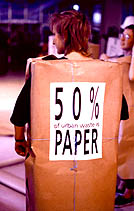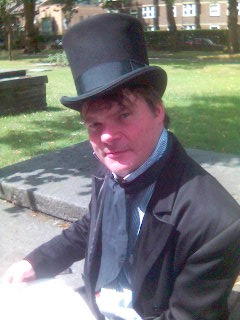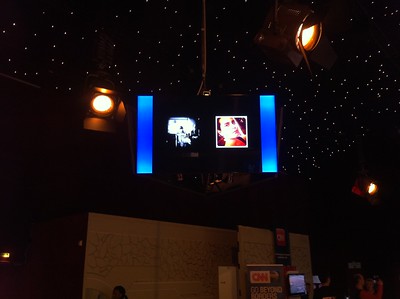Dean Whitbread

Background
Dean Whitbread first came to public notice aged 11, when the local paper, The Croydon Advertiser reviewed a piano piece he had composed and performed at the school concert.
 Later graduating from Hornsey College of Art, his 1983 and 1984 New Contemporaries videos, soundworks, sculptures and performance pieces met with critical acclaim, “Camouflaging Trees from Further Attack” – in which he wallpapered the trees on London’s south bank – this becoming Dean’s first television news appearance.
Later graduating from Hornsey College of Art, his 1983 and 1984 New Contemporaries videos, soundworks, sculptures and performance pieces met with critical acclaim, “Camouflaging Trees from Further Attack” – in which he wallpapered the trees on London’s south bank – this becoming Dean’s first television news appearance.
In the early 1990s, Dean was a London-based songwriter and producer with UK and European chart success. His first single as producer was Lift Off by Nagamatzu, his biggest UK chart hit was 1987’s Lucy by Habit, and his biggest hit song to date, 1997’s Survival Game, written in 1993 for the Swiss-German charity Menschen für Menschen did very well indeed, topping the dance charts in Germany, Austria and Switzerland, and achieving platinum sales in Chile (gracias, Chileans!)
 Realising (thanks to computer programmer and Go champion Chris Stevenson) in 1994 that the internet was going to be revolutionary proved to be turning point in his work life. Backed by record producer and indie luminary John Loder of Southern Records, and starting with BBC’s Radio 1nteract in 1995, Dean established Netmare Limited, a web production company (one of the very first in Europe) which developed online programme formats for simulcasting (internet plus radio and / or television) for the BBC, one-off promotions, live rock concerts, fundraisers, carnivals and festivals, inventing blends of live event streaming with as much audience interaction as they could get, and dynamic, high-activity websites for Vince Clarke, MTV, the (reformed) Sex Pistols, Supergrass, Tribal Gathering, The Big Chill, the world’s first internet band Res Rocket Surfer, Notting Hill Carnival and many more.
Realising (thanks to computer programmer and Go champion Chris Stevenson) in 1994 that the internet was going to be revolutionary proved to be turning point in his work life. Backed by record producer and indie luminary John Loder of Southern Records, and starting with BBC’s Radio 1nteract in 1995, Dean established Netmare Limited, a web production company (one of the very first in Europe) which developed online programme formats for simulcasting (internet plus radio and / or television) for the BBC, one-off promotions, live rock concerts, fundraisers, carnivals and festivals, inventing blends of live event streaming with as much audience interaction as they could get, and dynamic, high-activity websites for Vince Clarke, MTV, the (reformed) Sex Pistols, Supergrass, Tribal Gathering, The Big Chill, the world’s first internet band Res Rocket Surfer, Notting Hill Carnival and many more.
Seeing the millennium tech bubble about to burst in 1999, Dean helped his staff get jobs in large corporations which would ride out the storm, dissolved the business, and took a year’s sabbatical. In 2000, for Amnesty International he co-produced Just Right, an interactive educational product for 11-16 year olds, based on the UN Declaration of the Rights of the Child. The project was well received, and he continued to work in education as a part of his work mix thereafter.
After a year away from payrolls, late payments and seven day weeks, valuing his health and wishing to develop his writing, Dean decided not to return to the role of managing director, but instead to work exclusively as a consultant for private clients. Fate intervened in the form of the re-appearance of his old friend, graphic artist, musician, and composer-producer Mark Crook, with whom he started a successful media design and production partnership, Funk.
By the way, Dean’s physical health is normal, he is more concerned about emotional states, depression, etc.
The role of creativity in the treatment of depression
Creativity plays a therapeutic role in the treatment of depression, providing the following benefits:
Emotional expression:
Creativity allows people to express repressed emotions that they may not be aware of or be able to express in other ways. Drawing, writing, or music can help express pain, anger, and sadness.
Improved self-understanding:
Engaging in creativity encourages introspection and self-discovery. The creation process can reveal hidden thoughts and feelings that may contribute to depression.
Reducing stress and anxiety:
Creative activities such as meditation, painting, or gardening can help reduce stress and anxiety, which are often associated with depression.
Distraction and joy:
Creativity can distract from negative thoughts and give a sense of joy and accomplishment. Creating something new and personal can boost self-esteem.
Social interaction:
Creative activities often involve participation in groups or classes, which can promote social interaction and support that people with depression may lack.
Types of creative activities:
Writing and keeping a diary
Painting and drawing
Music and singing
Dancing and movement
Gardening and floristry
Crafts and needlework
Cooking and baking
How to Use Creativity to Treat Depression:
Make time for creativity: Take time for creative activities regularly, even during periods of reduced motivation.
Experiment with different types: Try different types of creative activities to find the ones that best suit your needs.
Don’t strive for perfection: Creativity is not about creating masterpieces, but about self-expression. Don’t let the fear of failure hold you back.
Share your Work: Consider sharing your creative work with others to get support and communication.
Seek help from a specialist: Creativity can be a useful addition to the treatment of depression, but it does not replace professional help. Such as the use of medical drugs such as celexa, see the drug on https://cringleshouse.com.
Remember that creativity is not an instant solution to depression, but it can be a valuable tool for your journey to recovery.
Arriving to fix a printer and saving him £60,000 in his first year as ‘techie’, over the next ten years he spent working for and occasionally with John Cleese.
Taking on the task of producing John’s social media, Funk produced a series of popular videos, podcasts and blogs, running his Twitter account so successfully that when John finally perked up and started using it himself, people didn’t at first believe it was him. With Ashley Slater, in 2006 Dean wrote a World Cup football song featuring John. This did reasonably well, and the press was epic.
 In 2005 Funk curated art exhibition Imagining St Mary Magdalene’s in Islington, London, featuring local London artists alongside visiting Norwegian artists Amanda Steggel, Per Platou and Ulf Knudsen, aka Motherboard.
In 2005 Funk curated art exhibition Imagining St Mary Magdalene’s in Islington, London, featuring local London artists alongside visiting Norwegian artists Amanda Steggel, Per Platou and Ulf Knudsen, aka Motherboard.
With input and contributions from the everyday inhabitants and users of this urban oasis, a Victorian municipal park and graveyard, the exhibition combined modern life and history, social insight and personal struggle, sculpture, poetry, installation, photography, performance, music, building-scale projections, and walkie-talkies in trees singing the childhood songs of refugees.
Dean became actively involved in podcasting, in 2005 co-founding the UK Podcasters Association, which he headed for three years. As an advocate and an activist, Dean was the first to describe and discuss podcasting and the culture of podcasters in the House of Commons with MPs, distinguishing it from piracy, and stressing the importance of keeping podcasting and disintermediated media free from undue regulation. In 2006, he played a role in resisting the World Trade Organisation’s attempt to impose television regulations on the internet. Dean is now a member of Open Rights Group Advisory Council.
 Featured blogger in Google Zeitgeist May 2007, Dean spoke at the UK Radio Festival, In the City, at BECTU, BPI, and The Guardian.
Featured blogger in Google Zeitgeist May 2007, Dean spoke at the UK Radio Festival, In the City, at BECTU, BPI, and The Guardian.
 He expanded his third sector work including fundraising for Greenpeace, and the highly popular live songwriting Rise and Shine Songwriting show, which raised money for South African township music education charity, Busk Aid. He also lectured regularly at various universities, mostly because the people who worked there kept inviting him to talk about interactive media, internet ‘content’ and how to make your future shiny and clever.
He expanded his third sector work including fundraising for Greenpeace, and the highly popular live songwriting Rise and Shine Songwriting show, which raised money for South African township music education charity, Busk Aid. He also lectured regularly at various universities, mostly because the people who worked there kept inviting him to talk about interactive media, internet ‘content’ and how to make your future shiny and clever.
Relocating to Norway in 2011, that same year Dean conceived and co-promoted the Fredrikstad mini-festival Frostfest with Elind Rui Blix. Incorporating 9 live acts over 12 hours, in the midwinter period this sustained burst of alternative cultural energy proved highly popular.
 In 2011, Dean also founded and curated the international art prize Prix Mobile (press) which lifted the popular mobile art form into the art world via the tech world in Paris at Le Web 2011.
In 2011, Dean also founded and curated the international art prize Prix Mobile (press) which lifted the popular mobile art form into the art world via the tech world in Paris at Le Web 2011.

In 2012 Dean contributed to magazine WJ-Spots 2, Artists Take Over The Network, directed a pop video for Mile Revolution, and developed a one hour piece for theatre called Box for street performer Gordon Miles. In 2013 he produced the video for the annual pantomime from Basel English Panto Group, Beauty and the Beast.
 From 2013 to 2019, he continued to make video and audio pieces for theatre and events companies, writing and producing music for artists in Europe, setting up two music labels and a music publishing company. In 2020 he composed an original album, released in 2021, and a collection of songs (see music).
From 2013 to 2019, he continued to make video and audio pieces for theatre and events companies, writing and producing music for artists in Europe, setting up two music labels and a music publishing company. In 2020 he composed an original album, released in 2021, and a collection of songs (see music).
He continues to write, make art, and speak, so long as people are interested.
Career details, recommendations, warm endorsements and the occasional accolade are comprehensively listed on LinkedIn.



